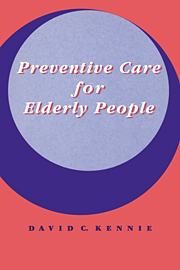Book contents
- Frontmatter
- Contents
- Acknowledgements
- 1 An overall perspective
- 2 What is health in old age?
- 3 The goals of health promotion for elderly people
- 4 A task for everyone
- 5 Critique of strategies
- 6 Cancer prevention
- 7 The prevention of non-cancerous health problems
- 8 Enhancing functional status
- 9 Strengthening support systems
- 10 Summary of problems and strategies
- 11 Tailoring strategies to individuals
- 12 Targeting, screening and surveillance in primary care
- 13 Practical aspects of implementation
- 14 The costs of preventive care and health promotion
- Index
2 - What is health in old age?
Published online by Cambridge University Press: 15 October 2009
- Frontmatter
- Contents
- Acknowledgements
- 1 An overall perspective
- 2 What is health in old age?
- 3 The goals of health promotion for elderly people
- 4 A task for everyone
- 5 Critique of strategies
- 6 Cancer prevention
- 7 The prevention of non-cancerous health problems
- 8 Enhancing functional status
- 9 Strengthening support systems
- 10 Summary of problems and strategies
- 11 Tailoring strategies to individuals
- 12 Targeting, screening and surveillance in primary care
- 13 Practical aspects of implementation
- 14 The costs of preventive care and health promotion
- Index
Summary
The health of a nation is one of its most valuable resources, and is one foundation for the generation of economic wealth. This idea begs the questions: what exactly is health, and in particular, what does it mean to elderly people? Several concepts have been propounded. One of the most commonly quoted is that of the World Health Organization (WHO) who took a broad perspective and defined health as ‘a state of complete physical, mental and social well-being’. There are, however, several problems with this type of definition. Firstly, it is too perfect and may create an inappropriate escalation of demand. Complete physical, mental and social wellbeing means the avoidance of influenza or better access to public facilities for the disabled. It may also mean an increasingly higher pension and better housing or any rights or civil liberties that make the elderly person more content. Taken to its extreme, it can mean virtually any physical goods to keep that person satisfied. Using WHO's definition of perfect health begins to blur the margins between the search for legitimate and feasible health promotional strategies within a society and its narcissistic pursuit of hedonism. Secondly, WHO defines a perfect health that, as we see in Chapter 14, few people even wish to try to attain. The achievement of perfect health is not without a variety of unacceptable costs to many of the individuals concerned.
- Type
- Chapter
- Information
- Preventive Care for Elderly People , pp. 14 - 18Publisher: Cambridge University PressPrint publication year: 1993



